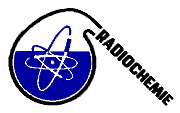Speaker
Dr
Mojmír Němec
(CTU FNSPE, centrum pro radiochemii a radiační chemii)
Description
The world demand for ultratrace analyses of radionuclides with long half-lives has been increasing not only in dating, material, environmental, geo-and cosmochemical studies, but also recently in the pharmaceutical and pharmacological applications. The most sensitive tool for such analyses is the dynamically advancing method of Accelerator Mass Spectrometry (AMS) which enables the determination of long-lived radionuclides in concentrations or amounts lower by up to 6 orders of magnitude than by radiometric methods.
AMS is a very powerful but technologically challenging analytical method that is, at present, mainly a domain of physicists. The sample preparation is often carried out by physicists without wider background in chemistry and its procedures or, in a better case, by chemists without practice in the work with radionuclides and/or sufficient knowledge of AMS needs and the collaboration between chemists and physicists in AMS, similarly to some other ultratrace analytical methods seems to be rather insufficient. However, making full use of the sensitivity of AMS is possible only if precise, reproducible, and well defined methods for sample preparation are used.
We suggest that here is the place where radiochemistry, after more than 100 years of its development, can help with its powerful toolbox of micropreparations, carrier and tracing methods, tracking of contamination sources, numerous separation procedures optimised for radiometric determinations and, in some cases, even with chemical suppression of isobars interferences. Full integration of radiochemistry separation and preparation methods into AMS sample preparation could create a synergy resulting in quality samples/methods well suited for high precision AMS measurements at further decreased background and improved sensitivity.
Thus, our contribution is an appeal on a closer collaboration between (radio)chemists and physicists in the field of Accelerator Mass Spectrometry, thus contributing to a better use of its potentials.
Primary author
Dr
Mojmír Němec
(CTU FNSPE, centrum pro radiochemii a radiační chemii)
Co-author
Prof.
Jan John
(CTU FNSPE, centrum pro radiochemii a radiační chemii)

